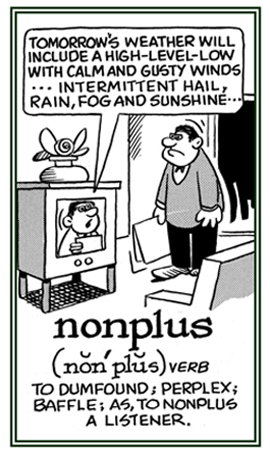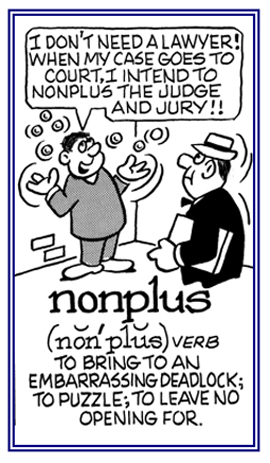Latin Proverbs, Mottoes, Phrases, and Words: Group N
(classical-language maxims, slogans, adages, proverbs, and words of wisdom that can still capture our modern imagination)
Expressions of general truths: Latin to English maxims, proverbs, and mottoes
Word entries are from Latin unless otherwise indicated.
In formal logic a non sequitur is a faulty conclusion arrived at by violating a principle of sound reasoning.
A common example is false generalization. In the sentence pair "It was that California guy who hotwired my car so he could steal it" and "All of these Californians are dirty thieves," the second sentence doesn't logically follow from the first; so, it is a non sequitur.
Motto on the colonial seal of the State of Georgia, USA.
Motto of Liverpool College, U.K.
A better known version is "All that glitters is not gold."
In the ancient Roman calendar, the ninth (nonus) day before the ides. In the Roman Catholic Church, the office for the ninth hour after sunrise, i.e. between noon and 3 p.m.
2. To render utterly perplexed; to puzzle completely: Steve could only understand English, and the movie he was watching, and which was only spoken in Spanish, completed nonplused and bewildered him!
3. To utter in a confused, and disconcerted way: Sam nonplused his way through the tale in a very muddled manner about how the accident happened.


Go to this Word A Day Revisited Index
so you can see more of Mickey Bach's cartoons.
The Latin equivalent of Gnothi seauton, a motto that was inscribed on the temple of Apolllo at Delphi.
This quotation was transmuted in the death-conscious Middle Ages into a frequently cited Memento mori: nosce tuam horam or "Know your hour" which refers to the warning that we should be aware of the hour of our death. This motto was commonly written on clock faces.
1. A remedy for a social, political, or economic problem; especially, an idea or plan that is often suggested but never proven to be successful; a favorite but untested remedy for problems or evils.
2. A medicine prepared or prescribed by an unqualified person whose claims for its effectiveness have no scientific or proven basis and the ingredients of which are usually secret; a quack remedy.
Quacks is a term for people who boast and pretend to cure diseases and the quack medicines they use for the treatment of diseases or the effects to be achieved with such treatments.
The historical basis for this "nostrum" word
The Great Plague of 1665-66 saw a great influx of quacks from Holland, charlatans from France, and mountebanks from Italy going around claiming to have "secret cures".
All of these people proclaimed the virtues of the secret concoction that they alone could produce. So, to make their claims more impressive, they labeled their "cures" as Nostrum, perhaps to impress people with their knowledge of Latin.
The term became a general name for any quack medicine or, in later years, for a patent medicine; however, the Latin meaning of nostrum, is merely "Our own"; that is, "our own remedy preparation".
A Latin reference to a person's last living utterance.
![]() Units of mottoes and proverbs listed by groups: A to X.
Units of mottoes and proverbs listed by groups: A to X.


